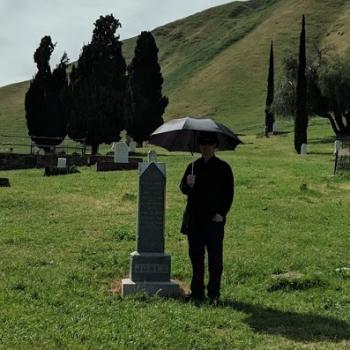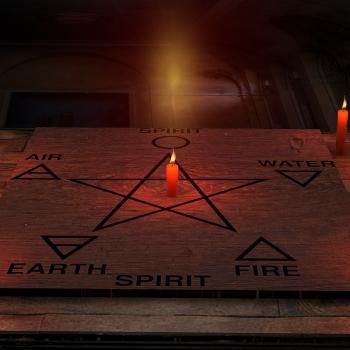It’s the beginning of the year, and we all have New Year’s resolutions. I’m not a fan of this tradition. It seems more like a tradition of setting ourselves up for failure. That being said, I have done something foolish, myself.
I started a brand new leg of my training these last couple of weeks. Without getting into the details, some of the aspects of this training require me to go back to the basics. Doing that is hard, and requires that I wrestle my ego down and say enough.

Following the necessary path requires discipline. Not only self-discipline, but just plain old do-what-you’re-told-and-trust-the-teacher-or-you’re-wasting-your-time discipline.
I like to think I am not alone in facing this challenge. This happens to everyone on the path. As we grow in knowledge and power, our discipline needs to ramp up, too. While a teenager might “know it all!” now that they know something, how much more challenging is it to learn later on in life when you really do know a few things?
Self-discipline is not a skill that can simply be learned. Like a host of other aspects of the deeper self, it is not a skill. If everyday skills are like things we own, discipline is something that comes to own us.
Like other aspects of character, discipline cannot be learned. It must be grown.
Discipline and Self-Discipline
Self-discipline gets a bad rep these days. The easy reason for that might be cultural. We somehow liken self-discipline to discipline – that is, discipline driven from the outside.
Discipline is unpopular because most people don’t like to be told what to do. This is true in everyday life, and it’s all the more true in the Pagan subculture.
The second reason that discipline gets a bad rep is that it’s hard. We live in a time when so many things are easy. Heck, I work a tidy little office job where the worst things I need to worry about are ennui, alienation of labor, and the occasional reorg.
Discipline – the ability to truly and wholly follow direction – is rare and powerful. With just a little bit of it (in the sense of doing what I’m told), I’m pretty much golden at work.
And yet we struggle against external discipline’s constraints every day. Balancing it with self-determination is one of the great challenges of modern office life. It’s ridiculous, but it’s true.
External discipline and self-discipline are not contentious opposites – they are polar opposites. It’s not a matter of having one or the other. These two types of discipline are two sides of the same coin, two ends of the same magnet. They only seem to fight when we stand on one side or the other.
![Seungmu (monk dance) ©2009 by Polly Peterson [used with permission]](https://wp-media.patheos.com/blogs/agora/files/2018/01/170820-Seungmu-monk-dance-1.jpg)
Discipline and self-discipline are two aspects of the same underlying principle. Worse, it is only possible to truly be disciplined when you can master both.
Initially, discipline comes from the outside. We begin when we yoke ourselves to something greater, and do what we’re told for the good of the whole. Yet those who would control us are hell-bent on teaching us that that is the sum total of all discipline.
We are taught that to lead a disciplined life, we must kneel before greater powers and do as we’re told. And that really is the first step. It’s just not the last.
The First Steps of Discipline
All discipline grows this same way. We begin by doing what we’re told.
The first steps of discipline come early, maybe when we learn that we’d best not cross the street without help. Eventually, we learn the discipline of looking both ways for ourselves, and where and when to cross the street for our own safety. Eventually, we learn to run wild, but still with the self-discipline not to get hit by a rushing car.
When I was young, I was super-undisciplined. Yet the grass was greener on the other side of the fence. I wanted discipline and I wanted it desperately. But I was, at the same time, unwilling to listen to most anyone. This was terrible for the simple reason that I was a kid and I didn’t have the experience to know better than anyone, let alone everyone.
But at least I did something smart. I saw the people with self-discipline, unruffled by the everyday tragedies of life, and I made myself their student. At first it was martial arts. Then it was meditation. Then it was magic. Then the void.
Discipline is not a skill. It’s not something we can study in school, or pick up at a weekend seminar. Discipline is a feature of what Westerners call the soul; it is part of character. And as much as character is destiny, we can shape our destiny by cultivating character.
The first step is to find someone who already has discipline – really has it – and ask them, “how?” If you’re really lucky, maybe they’re in a position to help. More likely, you’ll get a few crumbs to help you on your way. Often that is enough.
![Monk Shoes ©2009 by Polly Peterson [used with permission]](https://wp-media.patheos.com/blogs/agora/files/2018/01/270820-monk-shoes-1.jpg)
The Danger(ousness) of Discipline
Some people hold up discipline as something dangerous. And you know what? They’re absolutely right. It is dangerous, like all things that are powerful are dangerous.
We do not come to any path of self-cultivation, whether Paganism, magic, or any other spiritual discipline, because we want to remain weak. If we’re honest, we come to these paths to seek power or to ally with power. There’s nothing wrong with that.
Our teachers know that, too. That’s why there are rules imposed. In the martial arts, it often starts as simple as, “we are going to teach you to fight – now don’t go around picking fights.” Such training has deep impact, as well. These early lessons are not lost on the students.
I have spent a lot of my life hanging out with martial artists, and one thing I know for sure is that (at least in my crowd) these are about the hardest people in the world to get into a fight. Their defenses start several layers before the fight even considers getting going and they dodge with powerful hidden techniques such as diffusion, misdirection, humility, self-confidence, and clarity.
ProTip: Changing your destiny means developing character. Developing character starts with discipline. And discipline starts with a single act. If you want it, and you want it with all your heart, but you have nowhere to begin, begin with a single act.
It doesn’t really matter what that act is – just that you do it, again and again. Find something that calls you. If you want to be a martial artist, learn a form, or even a single move, and devote yourself to it. If you’re an artist, practice a single technique. If you’re a writer, write a single page. If a magician, a single ritual.
Of course, that is only the first step. But it’s a good one.















